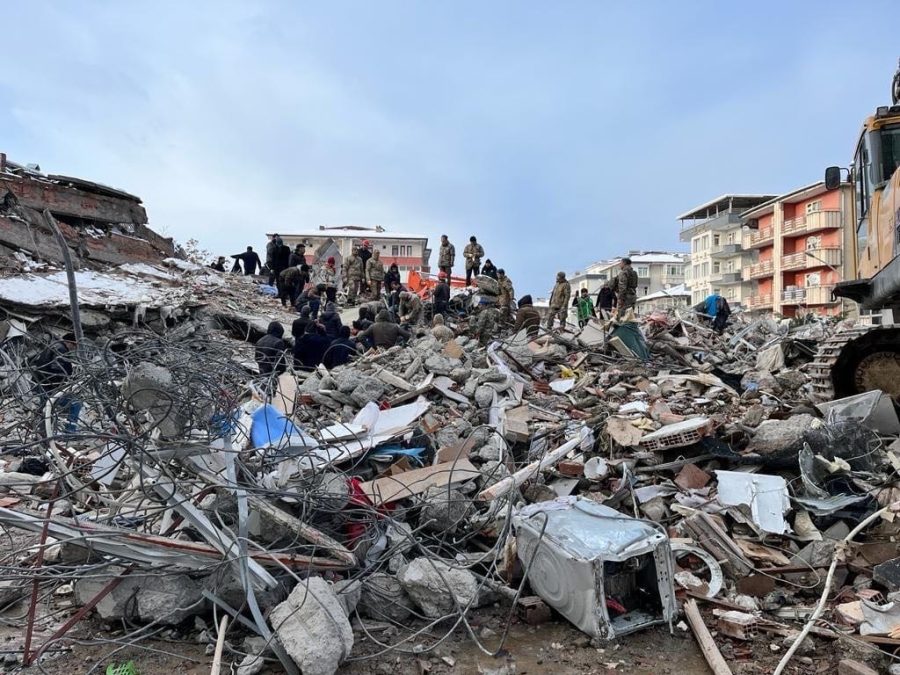Shifting Plates, Shifting Tensions
Not only did the recent earthquakes in Syria and Turkey, with registered magnitudes of 7.5, surpass death tolls of 50,000, they have had a heavy impact on increasing the tension between the two countries due to political leadership, scarcity of resources, and their overall economic situations. This especially helps because these two countries’ histories are both riddled with major achievements and rich history but until modern times these two countries’ downfall has been imminent due to wars, political leaders, poverty and a history of natural disasters just to name a few.
To truly understand why and how the earthquakes happened one must understand the two countries’ geography. Both Turkey and Syria are located where the African and Eurasian tectonic plates meet. This causes the area of both countries to be seismically active, or prone to earthquakes. Major quakes in Turkey include the 1999 İzmit earthquake (magnitude 7.6), with a death toll of 17,000 people. Another one would be the 1939 Erzincan earthquake (magnitude 7.8) which left a total of 20,000 people dead. For Syria, earthquake records are scarce; however, scholars have been able to pinpoint some major earthquakes, such as one in 1170 that appears to have been the most powerful earthquake to ever occur in the area, and the 1872 Amik earthquake (magnitude 7.0), which happened in both Turkey and Syria.
Though these most recent earthquakes have affected the economic growth of both countries, they’ve mainly impacted Syria in this regard, due to the ongoing Syrian Civil War, which began in 2011 when Bashar al-Assad violently suppressed calls for his removal from the government. The war is still being fought by the Free Syrian Army, the Kurdish-dominated Syrian Democratic Forces, and a coalition of SAA defectors supported by Western countries such as the U.S. . Although the fighting has seemed to calm down, especially after large-scale engagements with Islamic State forces, the war is still flaring in certain parts of Syria. Due to inflation caused by war, a resulting fall in the value of currency and severe fuel shortages have plagued the country—both problems which a violent earthquake only worsens in an economically struggling country. Turkey may be doing slightly better, but its economy has been on a downswing ever since 2013. Turkey must import major lifeblood utilities such as fuel, causing inflation and weakening the local currency. Studies conclude that more than two-thirds of citizens in Turkey are struggling to pay for food and rent, which are, again, problems earthquakes do not help. Neither government’s response has helped matters.
Of course, the earthquakes had devastating physical effects, between the collapse of thousands of buildings, tens of thousands of deaths, and evacuees being separated from their families. Unsurprisingly, given the scale of the catastrophe, it did not take long for organizations and other countries to start relief efforts, the latter group including Qatar, the UAE, Kuwait, Egypt, Israel, the United States and Iran, just to name a few. These countries provided support such as big donations of literal tons of supplies, built relief centers and pledged to give aid to Turkey. The same type of relief is going to Syria, but in smaller numbers. Countries that have decided to help Syria include (but are not limited to) Russia, which has pledged security help, Jordan, which has sent supply flights to both countries, and the Red Cross Society of China, which has pledged to give $200,000 cash in emergency aid to their counterparts in both Turkey and Syria.
While it is impossible to fully plan for an earthquake, I still feel that this was a failure of preparation. Scientists knew that a major earthquake was going to occur but had no idea when and where exactly the earthquake would occur. If people had even the slightest idea of where and how devastating this earthquake would be, we might expect fewer casualties and separated families due to better planning. Next, the relief effort in Syria is smaller than the amount of help and resources Turkey received, for the obvious reason that the country has been fighting a bitter civil war for over a decade. This damages its economy, ruins the lives of its civilians, destabilizes its political structure and reduces overall safety, which leads global superpowers to give less relief due to the risky state of the country. That civil war was caused because of Bashar al-Assad’s desire to stay in power, causing thousands of unnecessary deaths. In my opinion, if the Syrian civil war had been ended before the earthquake (or never happened in the first place) the Syrian government could direct relief efforts to its citizens on its own, rather than depending on other countries and organizations. You also have to understand that many structures in these countries are not necessarily built with foundations capable of resisting an earthquake. Add that to the 7.5 magnitude of the earthquakes, and you see how buildings collapsed, causing more deaths; how evacuations separated families; how roads were blocked by debris, slowing evacuations and relief efforts. The answer is clear: both of these countries need more stability, politically and economically, in order to be able to serve their citizens during disasters like these.
Sources:
https://www.cfr.org/global-conflict-tracker/conflict/conflict-syria
https://www.euronews.com/2022/11/09/everything-is-overheating-why-is-turkeys-economy-in-such-a-mess
